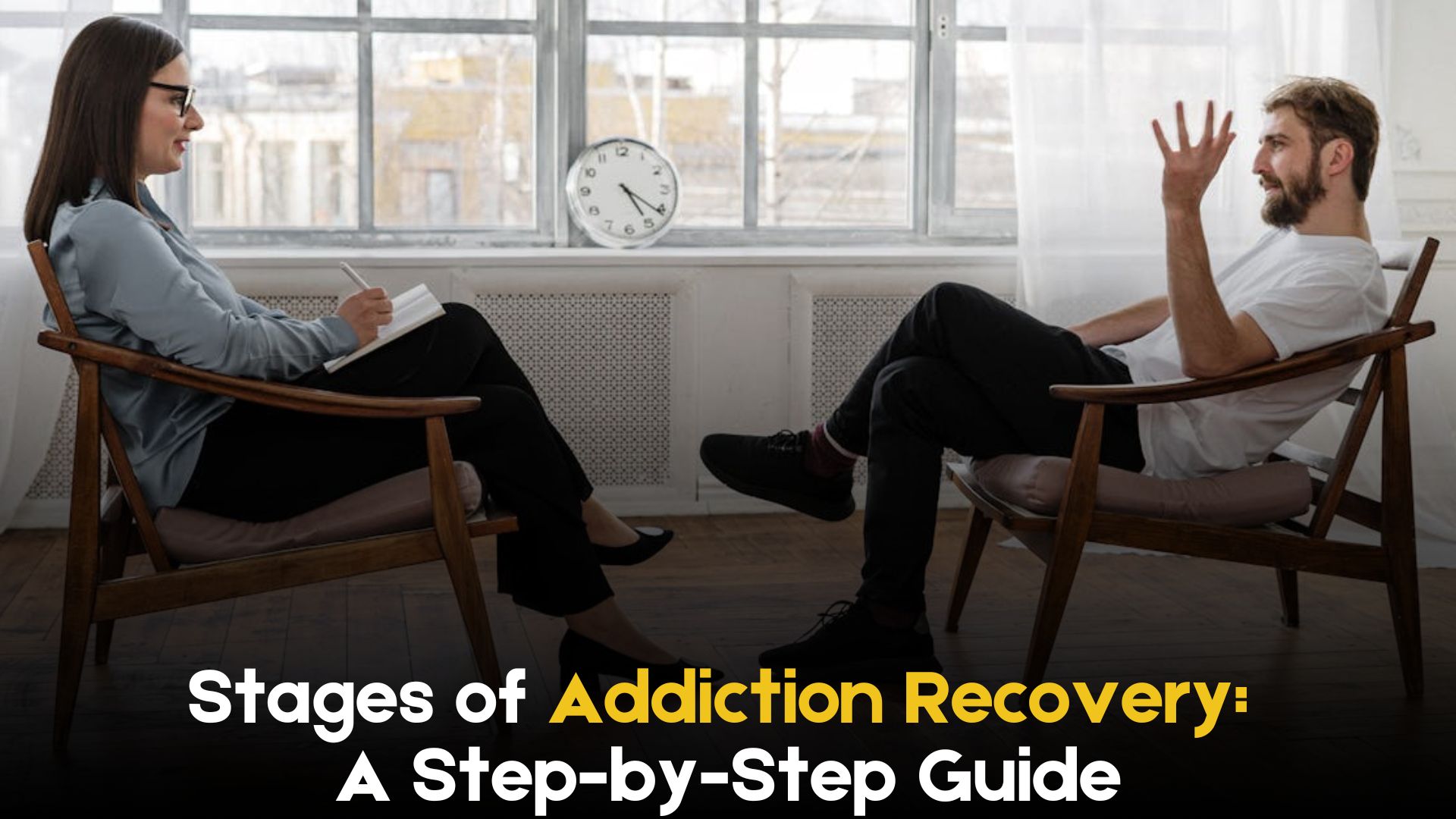Recovering from addiction is a journey that often requires deep commitment, patience, and personal growth. While everyone’s path to recovery is unique, there are common stages that many individuals go through. Understanding these stages not only aids individuals battling addiction but also helps their families and loved ones support them.
This article explores each step of addiction recovery, providing a guide to the phases of healing, growth, and transformation.
1. Precontemplation Stage: Recognizing the Problem
In the initial pre-contemplation stage, people struggling with addiction often do not believe that they have an issue. This stage can be marked by denial or a lack of awareness. They may think they have control over their behavior or believe the consequences of their addiction aren’t severe. In other cases, they may feel that addiction serves a purpose, like numbing emotional pain or relieving stress, and are reluctant to let it go.
Characteristics of the pre-contemplation Stage:
- Denial: There is often little to no acknowledgment of a problem.
- Rationalization: The individual may believe they have control over the addiction.
- Minimization: Belief that their substance use or behavior doesn’t seriously impact them or others.
How to Support Someone in Precontemplation:
Support during this phase should be gentle and nonjudgmental. Family members and friends can express their concerns in a compassionate manner, avoiding blame. Educational materials, personal stories of recovery, or support groups can serve as gentle prompts, helping to gradually build awareness and shift the individual’s perspective.
2. Contemplation Stage: Weighing the Pros and Cons
In the contemplation stage, the individual becomes more aware of the impact of addiction on their life. They may start to feel guilt, shame, or anxiety, recognizing that their behavior might be harmful. However, they may still be ambivalent about change, grappling with the pros and cons of letting go of the addiction. This stage is often one of the longest in the recovery process, as it involves deep introspection and readiness to address fears about the future.
Characteristics of the Contemplation Stage:
- Increased Awareness: A clearer understanding of how addiction affects relationships, health, and self-esteem.
- Conflicted Feelings: The individual may feel torn between desiring change and fearing the unknown.
- Recognition of Consequences: Beginning to see the negative impacts addiction has had on their personal, social, and professional life.
How to Support Someone in Contemplation:
During contemplation, loved ones can be supported by listening, empathizing, and encouraging reflection without pushing for immediate change. Affirming the individual’s thoughts about the benefits of recovery and providing resources for counseling or support groups can help them weigh their options constructively.
3. Preparation Stage: Planning for Change

At the preparation stage, individuals move from contemplation to action. Here, they begin to plan concrete steps toward recovery. This phase involves researching treatment options, reaching out to support systems, and setting specific goals. Individuals in this stage may also decide on whether to enter inpatient or outpatient rehab, attend counseling, or join a support group.
Characteristics of the Preparation Stage:
- Goal Setting: The individual sets realistic, achievable goals for recovery.
- Seeking Resources: Research recovery programs, attending preliminary meetings, or scheduling therapy.
- Building a Support Network: Reaching out to friends, family, or mentors who can provide accountability and encouragement.
How to Support Someone in Preparation:
Friends and family can help by participating in the planning process, researching treatment options together, or arranging transportation to therapy or group sessions. Encouragement and positive reinforcement can also help reinforce the commitment to change, while patience is key, as any new venture can bring nervousness or hesitation.
4. Action Stage: Committing to the Recovery Process
The action stage is characterized by actively taking steps to overcome addiction. During this phase, individuals engage fully in treatment programs, whether through therapy, rehab, or community support groups. They also start replacing old habits with healthier ones, building skills that will help them maintain sobriety. This stage requires a high level of commitment and effort as they work through cravings, identify triggers, and address the root causes of their addiction.
Characteristics of the Action Stage:
- Treatment Engagement: Commitment to therapy, counseling, or rehab programs.
- Lifestyle Changes: Establishing new, healthy routines and habits.
- Coping Skills: Learning methods to handle stress, cravings, and other challenges without resorting to addictive behaviors.
How to Support Someone in Action:
Support at this stage is crucial for maintaining morale. Friends and family can assist by helping individuals maintain focus on their goals, celebrating achievements, and remaining a steady source of encouragement. Family members should remember that relapses are common and should approach any setbacks with compassion rather than criticism.
5. Maintenance Stage: Building a New, Sustainable Lifestyle
The maintenance stage focuses on preventing relapse and ensuring long-term recovery. By this point, individuals are equipped with various strategies to manage stress, avoid triggers, and sustain healthy habits. However, this stage can be challenging, as it requires vigilance and ongoing self-care to prevent slipping back into old patterns. It’s also during this time that individuals may start to redefine their identities, finding new purpose and joy in life without addiction.
Characteristics of the Maintenance Stage:
- Relapse Prevention: Actively using coping mechanisms to manage cravings and avoid triggers.
- Continued Support Systems: Regularly attending support groups or counseling.
- Personal Growth: Engaging in activities or hobbies that bring fulfillment and meaning.
How to Support Someone in Maintenance:
Loved ones should continue to offer support and recognize the importance of this long-term stage. Encouraging the individual to participate in ongoing therapy, explore fulfilling activities, and build strong social connections can enhance their resilience. Practicing open communication, without pressuring or overly questioning, fosters a supportive and understanding environment.
6. Relapse as Part of Recovery: Understanding Setbacks
Although not an official stage, relapse can be a part of the recovery journey. It’s essential to view relapse not as a failure but as an opportunity to identify additional areas of focus. Many individuals experience more than one cycle of recovery and relapse before reaching long-term sobriety. The key is to treat relapse as a learning experience rather than a setback.
Characteristics of Relapse:
- Return to Substance Use or Addictive Behaviors: Engaging in old habits.
- Feelings of Shame or Frustration: Individuals may feel disappointed in themselves.
- Acknowledgment of Triggers: Reflecting on what led to the relapse.
How to Handle Relapse:
For those experiencing relapse, support and compassion from family and friends are vital. Instead of criticizing, help them refocus on their recovery goals, encouraging them to seek help again. Counseling, renewed focus on triggers, and reinforcement of coping mechanisms can help prevent future relapses.
Building a Strong Support System for Recovery

A robust support system is a cornerstone of successful recovery. People recovering from addiction often benefit from the love and guidance of family, friends, and professional networks. Programs such as Alcoholics Anonymous (AA), Narcotics Anonymous (NA), and SMART Recovery offer structured environments where individuals can share experiences and receive encouragement from others on similar paths.
Components of an Effective Support System:
- Peer Support Groups: Organizations like AA and NA connect individuals with peers who understand their journey.
- Family Involvement: Family therapy and open communication help build stronger, supportive family dynamics.
- Professional Guidance: Therapists and counselors provide crucial tools for managing stress, self-doubt, and other triggers.
Life Skills and Coping Mechanisms for Lasting Recovery
Recovery from addiction often means developing new life skills that help individuals manage stress, solve problems, and improve relationships. These skills contribute to emotional resilience, enabling individuals to navigate daily challenges without turning to substances.
Key Life Skills for Recovery:
- Stress Management: Techniques like mindfulness, meditation, and exercise are essential for managing anxiety.
- Time Management: Structured routines reduce idle time, minimizing the temptation to revert to old habits.
- Communication Skills: Building healthier relationships through honest, respectful communication reduces social stress.
- Conflict Resolution: Learning to handle conflicts constructively reduces emotional triggers that could lead to relapse.
Embracing Recovery: A Journey Beyond Addiction
Recovery is more than simply avoiding addictive substances or behaviors—it’s about discovering a new way of life, one rooted in growth, connection, and self-awareness. As individuals move through the stages of recovery, they often discover inner strengths they hadn’t previously recognized.
Embracing a healthy lifestyle, creating new routines, and building positive relationships can redefine one’s purpose. This journey requires resilience, but every step forward is a victory that reinforces commitment to a fulfilling, substance-free life.
For those just beginning or still contemplating the process, remember that recovery is achievable. With perseverance, support, and self-compassion, it’s possible to build a life filled with hope, purpose, and lasting joy. The journey may be long, but the rewards of recovery are profound and enduring.
Conclusion:
Addiction recovery is an ongoing process that requires dedication, self-reflection, and continuous support. Understanding the stages of recovery helps individuals and their families to navigate the journey, offering insight into the challenges and successes each phase can bring.
By embracing this path one step at a time and celebrating progress, individuals can build a life free from addiction—grounded in resilience, purpose, and personal growth. Recovery is not a linear path but a lifelong commitment to a healthier, more fulfilling life.




Leave a Comment